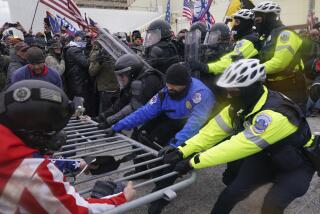N.Y., Protesters Wrangle in Court
- Share via
NEW YORK — City officials clashed with protest organizers during a Tuesday court hearing over their bid to hold a rally for 200,000 people in Central Park on the eve of next week’s Republican National Convention.
A gathering of that size would damage the park’s Great Lawn, New York officials argued during the acrimonious, two-hour session. But demonstrators said that denying them a permit to rally Sunday would be a violation of their free-speech rights.
Under a prior agreement, marchers will be allowed to parade past Madison Square Garden, the site of the convention. But there is no plan for where they will go afterward. And as the verbal sparring intensified Tuesday, some predicted that thousands would gather in 843-acre Central Park anyway -- drawing an uncertain police response.
“Nobody thought we’d be facing such a cliffhanger so close to the convention,” said Bill Dobbs, spokesman for United for Peace and Justice, an antiwar group that has been lobbying for the permit. “There’s been a lot of tension growing over this question, and we still don’t know what’s likely to happen in the streets.”
New York County Administrative Judge Jacqueline W. Silbermann said she would rule today on the group’s lawsuit seeking a permit and offered to help both sides find common ground.
March organizers, who initially said that they would call off the rally if they lost the court fight, have indicated that they might be amenable to compromise -- including putting fewer demonstrators in the park at different locations.
City officials have opposed the request to hold a gathering on the 55-acre Great Lawn, in the middle of Central Park, from 79th to 85th streets. They say that it would destroy reseeded grass and dramatically worsen congestion in an area that is usually packed Sunday afternoons with New Yorkers and tourists.
They also noted that the city had approved a Central Park rally permit during the convention week for the National Organization for Women. But that event, officials said, would include only 50,000 demonstrators and take place on the East Lawn, which some observers believed was less susceptible to environmental damage.
“The [Great Lawn] cannot accommodate an event of this size,” said Jonathan Pines, a city attorney. It was “simply too late” to consider the plan, he said.
“Our main question is: Why are we here now?” he said, suggesting that organizers were using delaying tactics. “We could have been here in May, when organizers were first denied a Central Park permit. We could have been here in June or July. But instead we’re facing this now, with mere days left before the convention begins.”
March organizers said they had no choice, explaining that their group had reluctantly agreed several weeks ago to an alternative rally site on the city’s West Side Highway. But after members complained that the isolated location was not conducive to a rally, the coalition decided to seek a permit in the courts.
On Monday, a federal court denied a request by the National Council of Arab Americans and the ANSWER Coalition to hold a rally on the Great Lawn during the convention, citing similar environmental and traffic concerns.
The public relations battle between city officials and protest groups has become increasingly nasty.
Anticipating large and possibly unruly protests, Republicans are seeking to link activists descending on New York to the Democratic Party. Ed Gillespie, chairman of the Republican National Committee, has suggested that the line between the Democrats and the protesters is “fairly blurry.”
“I’m not sure they want to have Democrats engaging in violence in New York against our convention,” he told the New York Times this week. “It would seem disrespectful and antidemocratic.”
Democrats angrily rejected that charge. Terry McAuliffe, the Democratic National Committee chairman, said in a statement that “Ed Gillespie is just attempting to deceive, dissemble and distort the facts as one more way to mislead America and masquerade their contention.”
In an interview Monday, RNC spokesman Jim Dyke backed away from Gillespie’s published comments, saying Republicans did not believe that the Democratic Party would be responsible for protesters’ behavior. But he did suggest that the majority of activists coming to New York were Democrats.
Mayor Michael R. Bloomberg, a Republican, has refused to issue rally permits for the Great Lawn, insisting that his decision had nothing to do with partisan politics.
Although the park has staged huge events -- 750,000 attended a 1991 Paul Simon concert -- the mayor noted that New York had spent $18 million reseeding the lawn in 1997 and had protected it since then.
Others, however, have suggested that the right to free speech should prevail over landscaping concerns. Dobbs said that his group repeatedly had offered to post bonds to protect the lawn should damage occur, but with no agreement from the city.
Times staff writer Matea Gold contributed to this report.
More to Read
Sign up for Essential California
The most important California stories and recommendations in your inbox every morning.
You may occasionally receive promotional content from the Los Angeles Times.













